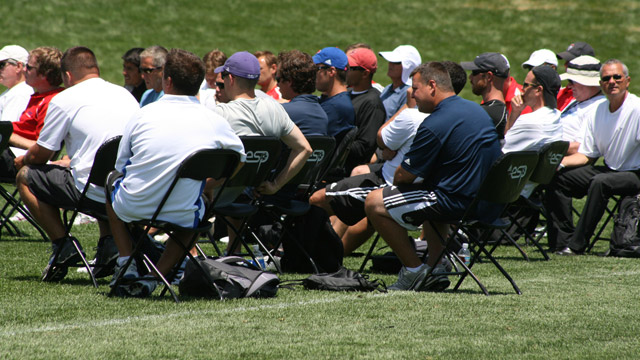 Should coaches be able to make
Should coaches be able to makecontact sooner?

Welcome to the inaugural edition of the TopDrawerSoccer.com Round Robin, where our editorial staff members weigh in on important topics in the world of American soccer. Please note that each opinion expressed is that of the author giving them, and not necessarily editorial policy at TopDrawerSoccer.com.
Today’s Topic: College Recruiting continues to be the mother ship of club soccer across the country. The NCAA is considering relaxing some of the regulations governing the contacting potential recruits by college programs at certain ages. Without getting into specifics, most direct, school-initiated communication has to wait until July 1 prior to the recruit’s senior year in high school. Despite this, communication between parties takes place in various ways prior to that, and offers are given and received, sometimes as early as the player’s sophomore year (on the Girls’ side).
Should the rules be tightened, relaxed or stay the same?
 Should coaches be able to make
Should coaches be able to makeRobert Ziegler: This is almost all about the Girls side. There is so much back-channel communication going on now, I really see no purpose for the rules to remain as they are. All it does now is make it difficult for players and their families to have the discussions with coaches they need to. In an environment where, a player who hasn’t committed midway through her junior year is considered to be late, it’s probably better to relax things and end the charade of 3rd-party communication and recruits trying telephone roulette to reach the coach in the office. This is in lieu of going the other way and banning all offers until July before the senior year.
Travis Clark: I'm all for a relaxation of the rules. Considering that players are committing so early now anyways, relaxing of the rules would hopefully ease some of the pressure on girls to commit so early -- some as soon as sophomore year of high school. Hopefully by doing that, it may even the playing field a bit and perhaps give players longer to ponder college options.
J.R. Eskilson: I'd actually rather see the rules tightened. To me, it is absurd that a 14-year-old who just started high school is already being pressured into making a decision about which college she will attend in four years. I'd like to see a strict stance on communication between the parties and (unofficial) visits before the middle of the sophomore year. In essence, I'd hope this would even the playing field in recruiting (especially in women's college soccer) and close the gap between the haves and the have-nots. Since 1990, only six schools have won the NCAA Division I Women's Soccer Championship. It is time for some more parity in women's college soccer and hopefully tightening up the rules will clear the path for the mid-majors to break through.
Caroline Yort: I don't think that tightening the rules would help. I think it would only make the process more underground than it already is. Having had a child just finish the recruiting process, I know the most frustrating thing was trying to contact a coach when he couldn't call back. For a teenager, those phone calls are hard enough to make once, let alone get up the courage to make time and time again, only to have the coach not answer and not be able to return the call. If the coach was simply allowed to return a phone call, the whole process would have been a lot easier. The NCAA could easily track that communication, I would think.
I also think that for the unofficial visits, the earlier the better. Non-athletes start visiting schools as early as ninth grade, so why shouldn't the athletes be able to do the same? I mean, if you can visit with the History Department Chair, why shouldn't you be able to visit with the soccer coach?
Robert Ziegler’s Final Word: This is about how the debate works out, although J.R.’s parity angle was a little unexpected. I think it is important for the NCAA to recognize that not everyone follows the rules (and frankly, some of the rules are counterintuitive), so since they can’t police them anyway, let’s not be giving anyone an unfair advantage. It levels the playing field and more importantly makes the recruiting process, as Caroline has said, friendlier to the prospective student-athlete.
Join us tomorrow for another version of Round Robin.